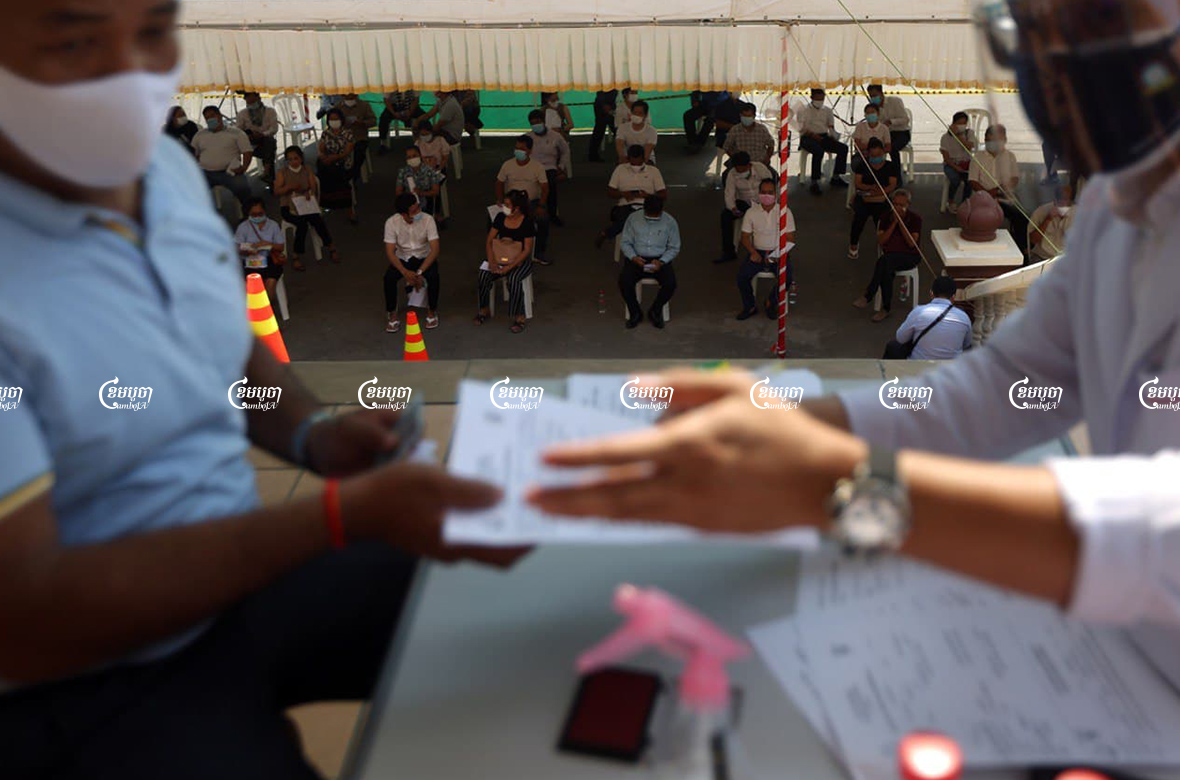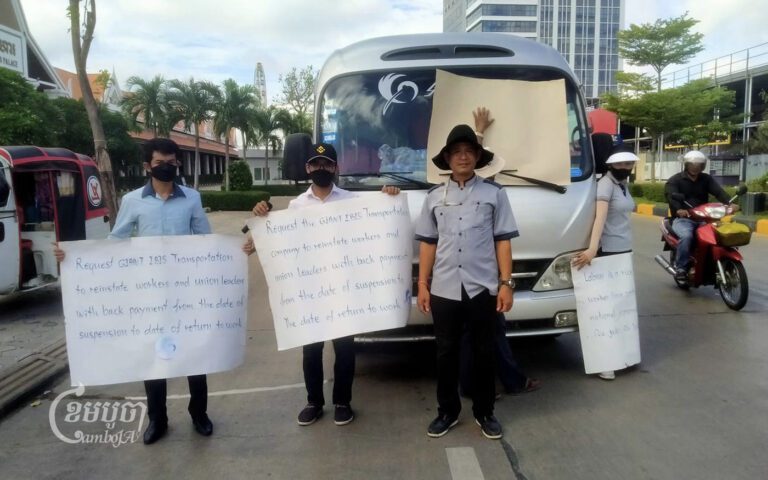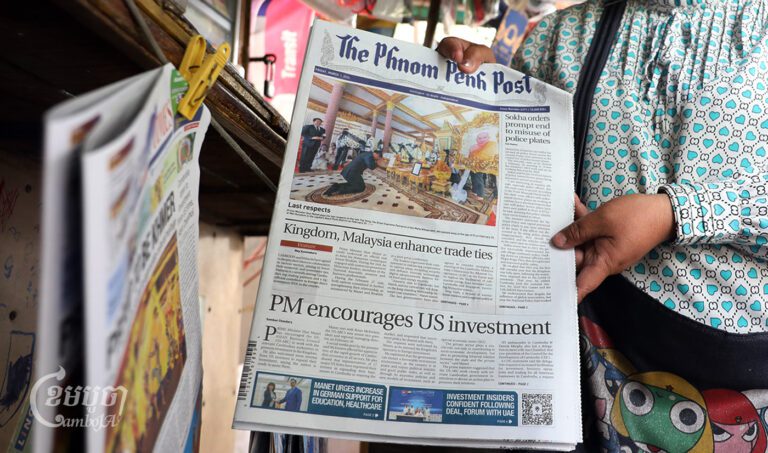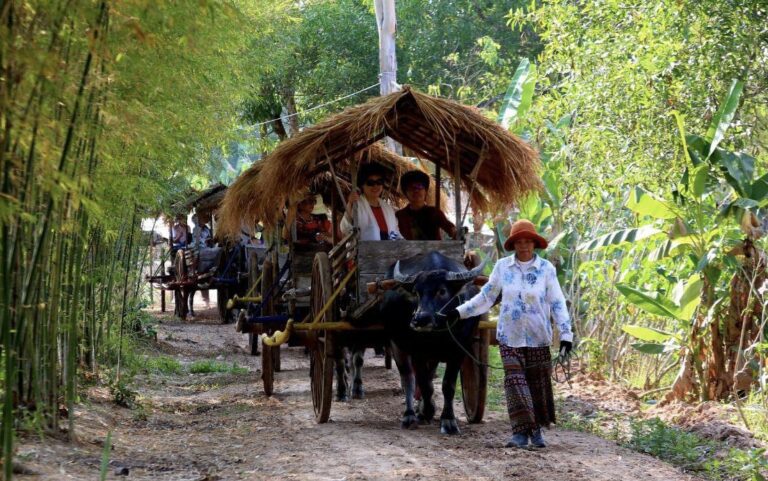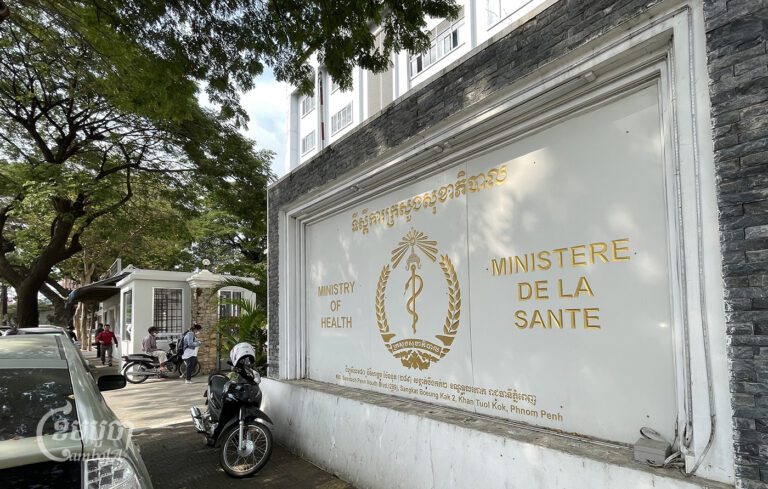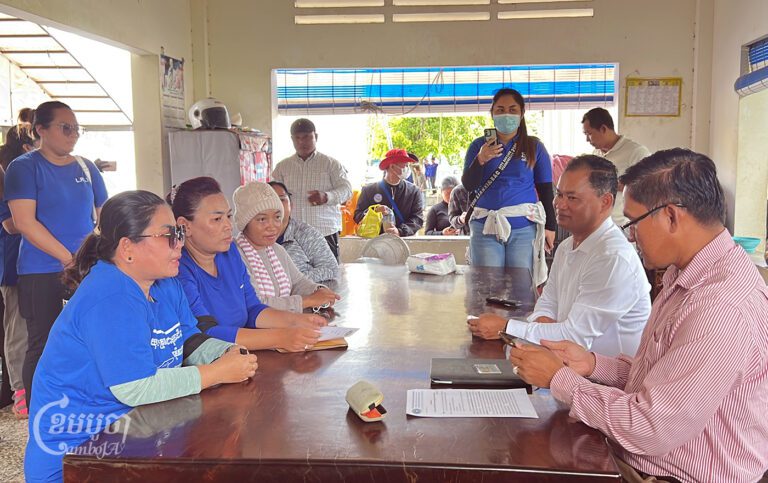Theang Somarakny has been fully vaccinated with two doses of the Chinese-made Sinopharm, but as COVID-19 cases increase in Cambodia, she’s looking for more reassurance — and an antibodies test to confirm her jabs worked as intended.
“I’m worried that I don’t have antibodies,” she told CamboJA, sharing her concerns that a lack of side effects of the inoculations could mean her body hasn’t produced a defence response. “If I have symptoms like fever, I am sure that there is a drug working in my body.”
Somarakny said she understood that the vaccine should help her immune system cope with an exposure to the novel coronavirus, should that happen. Still, she said, reports of people becoming infected with COVID-19 even after being vaccinated have left her unsure how effective the inoculations really are.
She might not be alone in that. Cambodia’s extensive vaccination campaign has relied almost entirely on the Chinese-produced vaccines, and other health agencies across Southeast Asia have also depended on these serums as a cornerstone of their own inoculation strategies. But new medical research does suggest these jabs, which are based on traditional methods using inactive viruses, typically produce fewer antibodies than vaccinations that use new mRNA technology, such as Pfizer and Moderna. These findings are now spurring health agencies across Asia to investigate ways to supplement their own vaccine rollouts that have used Sinopharm or Sinovac.
Still, both former and current physicians contacted by CamboJA said the Chinese-made vaccines have been tested for safety and effectiveness and should grant at least some immunity to those who receive both doses.
Dr. Seang Seng, who is now retired and living in the US, said antibody testing after COVID-19 vaccination is not a typical practice.
“So far there is no recommendation to test for antibodies after vaccination once the vaccine was approved, unless that person is ill after vaccination and the physician is interested to find out how protective his vaccine is,” he said. “Chinese vaccines were found to be less effective than Pfizer or Moderna, but they were approved by WHO and are better than not receiving a vaccine at all.”
Seng said newly developed vaccines are required to go through multiple phases of testing to prove they create a safe immune response.
But not all vaccines are made alike. Research published Thursday published in health journal the Lancet found antibody levels among Hong Kong health workers who have been fully vaccinated with BioNTech’s Pfizer mRNA shot are about 10 times higher than those observed in the recipients of inactivated virus vaccines.
What’s more, according to findings from a joint study between Thammasat University’s faculty of medicine and the National Centre for Genetic Engineering and Biotechnology, antibody levels in people fully vaccinated with the Sinovac vaccine appear to decline by half every 40 days.
The level of antibodies in people who received a second jab more than 60 days after the first was on average lower than that of those who got the second dose in less time, the study found.
As the novel coronavirus continues to mutate into new strains, the efficacy of the Chinese jabs has been found to range from 50 to almost 80 percent in trials and real-world studies, significantly lower than the mRNA vaccines developed by Moderna and Pfizer. That has raised concerns they may not be effective in taming the virus’s more infectious variants.
In Cambodia, medical professionals and public health officials are advising people to stay calm while cautioning against the widespread use of antibody tests like the one desired by Somarakny.
The Ministry of Health has maintained that antibody testing is not necessary to confirm vaccine efficacy, pointing out that the WHO has approved both of the Chinese-produced serums for widespread use. Ministry spokeswoman Or Vandine urged the public to trust the government and avoid misinformation about vaccines, particularly about rapid-testing for antibodies.
“[We] do not recognize any rapid test to find out how the vaccine creates antibodies. Even WHO still does not acknowledge or recommend using them,” Vandine said, adding that antibody testing should be done by trained professionals.
Vandine said that according to world studies, without naming the responsible institutions, that 80% of people fully vaccinated with either Sinovac or Sinopharm have been found to develop antibodies in moderately good levels.
WHO’s representative to Cambodia did not answer questions from CamboJA.
Though the physicians contacted by CamboJA didn’t verify the statistic used by Vandine, they pointed to the testing the Chinese vaccines have gone through to become approved by governments worldwide.
Dr. Mengly Quach, an Okhna and medical practitioner known for his work in private schooling, said antibody production depends in part on the individual immune systems of people who get vaccines.
Mengly said some COVID-19 vaccines, such as those produced in Western countries, are reported to be nearly 90 percent effective as compared with an efficacy rate of 60 percent in the Chinese-made serums.
“Those vaccines may not be required for antibody testing because they have already been proven to be highly effective, but vaccines from some countries should be tested so they can make a decision for extra dose,” he said.
These questions of efficiency have been renewed in Cambodia, which has achieved one of the highest vaccination rates in ASEAN by inoculating more than 5 million people. Health authorities have pledged to vaccinate 10 million people by the end of this year, a goal that relies almost entirely on Sinopharm and Sinovac. The state has so far received just 324,000 doses of AstraZeneca vaccine from the international COVAX facility and at this rate, by year-end, officials will have used a total of 20 million doses of Chinese-made vaccines to hit their target.
Prime Minister Hun Sen has said Cambodia is depending on China for its COVID-19 vaccination strategy. Last week, the prime minister ordered a study on the start of innoculations for children aged between 12 and 17 years, an expansion that would likely also require Chinese-made vaccines.
Despite the apparent success of the vaccination campaign, the number of COVID-19 cases and the viral death rate have remained relatively high. On Monday, the Health Ministry reported 790 new cases of COVID-19 and 22 deaths, bringing the total count to 67,971 and 1,128 deaths respectively since the pandemic began in early 2020.
Cambodia isn’t the only country in Asia that has made extensive use of the Chinese-produced vaccines, and neighboring states are now exploring ways to supplement regimens of Sinopharm or Sinovac. Some health agencies are considering adding a shot of an mRNA vaccine to boost overall effectiveness.
Officials in Thailand and Indonesia are beginning to use AstraZeneca and Moderna serums as booster shots after healthcare workers who were fully vaccinated with Sinovac became infected with COVID-19. Two such workers have reportedly died in Thailand, as did 30 in Indonesia.
Cambodia has not yet adopted a mixed-booster strategy, and it remains to be seen how the antibodies research will affect the vaccination campaign. But retired Dr. Taing Tek Hong said individual antibody testing might not make things any more clear for people who still have anxiety after their inoculations.
Tek Hong said the approval of all COVID-19 vaccines is based on clinical outcomes such as rate of infection, severity of the disease, hospitalization and mortality — not antibodies levels.
“Antibodies testing is very complicated and can yield false positive or false negative results,” he said. “Chinese vaccines have been reported to be effective against the original strain of SARS-CoV-2 , but less effective against the Delta strain.”
Even with some uncertainty, other residents of Phnom Penh are taking comfort that Chinese-made vaccines do still seem to be reducing the rates of serious illness due to COVID-19.
Chorn Chivorn, a 29-year-old resident of Phnom Penh, said he feels more confident after being vaccinated and isn’t considering doing antibody testing.
“It makes me feel more safe for daily living, but I still protect myself and be careful because vaccines are not 100 percent prevention,” he said. “After inoculation, even if we get a COVID infection, it will not be as serious because we have at least some immune protection.”


